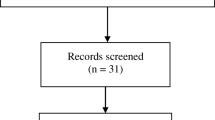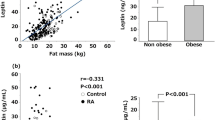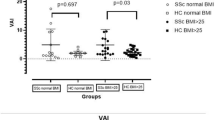Abstract
Background
Sarcoidosis is a chronic inflammatory disease characterized by non-caseating granuloma which etiology is unknown yet. Adipokines are different proteins synthesized by adipose tissue that have an influence on angiogenesis, hemostasis, lipid metabolism, and immune system regulation. Adipokines may play a role in the pathogenesis of sarcoidosis.
Objectives
To evaluate the serum adipokine levels in patients with sarcoidosis and to determine a possible correlation with clinical and laboratory signs of disease.
Methods
Forty-four biopsy-proven sarcoidosis patients followed at a single center and age- and sex-matched 41 healthy volunteers were included in the study. Demographic, clinical, laboratory, and radiological data were recorded and body mass index (BMI) was calculated in all patients. Routine laboratory tests (blood glucose, liver, and kidney function test) were measured. Serum adiponectin and leptin levels were measured by ELISA method.
Results
Among 44sarcoidosis patients, 13 (29.5%) were male and 31 (70.5%) were female. Twenty-one (47.7%) patients had erythema nodosum, three (6.8%) had uveitis, 40 (90.9%) had arthralgia, 32 (72.7%) had arthritis, 15 (34.1%) had enthesitis. Laboratory evaluation showed increased serum ACE level in 24 (54.5%) patients, increased serum calcium level in 11 (25%) patients, increased serum D3 level in 5 (11.4%) patients, and increased ESR and CRP levels in 22 (50%) and 23 (52.3%) patients, respectively. Compared with the control group, serum adiponectin levels were significantly higher in patients with sarcoidosis(p = 0.007). Serum adiponectin level was associated with arthralgia and ankle joint swelling (p = 0.007, p = 0.006 respectively). Serum leptin levels were similar in sarcoidosis patients and controls (p = 0.327). There was no relationship between serum leptin level and disease features (p > 0.05).
Conclusions
In this study, high serum adiponectin level was detected in patients with sarcoidosis while serum leptin level was similar in the sarcoidosis and control group. Adiponectin, an anti-inflammatory protein, may play a role in the pathogenesis of sarcoidosis. Studies are needed to shed light on this topic.
Key Points • Sarcoidosis is a chronic granulomatous disease characterized by granuloma formation • High serum adiponectin level was found in sarcoidosis patients • Serum adiponectin level was associated with some clinical features such as arthralgia and arthritis • High adiponectin levels in sarcoidosis patients may mitigate the inflammatory response, resulting in a mild form of the disease and/or spontaneous remission |
Similar content being viewed by others
References
Fantuzzi G (2005) Adipose tissue, adipokines, and inflammation. J Allergy Clin Immunol 115(5):911–920
Yudkin JS, Stehouwer CD, Emeis JJ, Coppack SW (1999) C-reactive protein in healthy subjects: association with obesity, insulin resistance, and endothelial dysfunction: a potential role for cytokines originating from adipose tissue? Arterioscler Thromb Vasc Biol 19:972–978
Lago F, Dieguez C, Gomez-Reino J, Gualillo O (2007) Adipokines as emerging mediators of immune response and inflammation. Nat Clin Pract Rheumatol 3(12):716–724
Carrión M, Frommer KW, Pérez-García S, Müller-Ladner U, Gomariz RP, Neumann E (2019) The adipokine network in rheumatic joint diseases. Int J Mol Sci 22:17–20
Fantuzzi G (2008) Adiponectin and inflammation: consensus and controversy. J Allergy Clin Immunol 121:326–330
Toussirot E, Streit G, Wendling D (2007) The contribution of adipose tissue and adipokines to inflammation in joint diseases. Curr Med Chem 14:1095–1100
Toussirot E, Gaugler B, Bouhaddi M, Nguyen NU, Saas P, Dumoulin G (2010) Elevated adiponectin serum levels in women with systemic autoimmune diseases. Mediat Inflamm 2010:938408
Baughman RP, Lower EE, du Bois RM (2003) Sarcoidosis. Lancet 361:1111–1118
Chung CP, Long AG, Solus JF (2009) Adipocytokines in systemic lupus erythematosus: relationship to inflammation, insulin resistance and coronary atherosclerosis. Lupus 18(9):799–806
Tang CH, Chiu YC, Tan TW, Yang RS, Fu WM (2007) Adiponectin enhances IL-6 production in human synovial fibroblast via an AdipoR1 receptor, AMPK, p38, and NF-κB pathway. J Immunol 179:5483–5492
Kusunoki N, Kitahara K, Kojima F (2010) Adiponectin stimulates prostaglandin E production in rheumatoid arthritis synovial fibroblasts. Arthritis Rheum 62:1641–1649
Toussirot É, Binda D, Gueugnon C, Dumoulin G (2012) Adiponectin in autoimmune diseases. Curr Med Chem 19(32):5474–5480
Xue Y, Jiang L, Cheng Q, Chen H, Yu Y (2012) Adipokines in psoriatic arthritis patients: the correlations with osteoclast precursors and bone erosions. PLoS One 7(10):e46740
Yurt S, Erman H, Korkmaz G, Kosar AF, Uysal P, Gelisgen R et al (2013) The role of feed regulating peptides on weight loss in patients with pulmonary tuberculosis. Clin Biochem 46:40–44
Otero M, Lago R, Gomez R (2006) Towards a proinflammatory and immunomodulatory emerging role of leptin. Rheumatology 45:944–950
Yoshino T, Kusunoki N, Tanaka N, Kaneko K, Kusunoki Y (2011) Elevated serum levels of resistin, leptin, and adiponectin are associated with CRP and also other clinical conditions in rheumatoid arthritis. Intern Med 50:269–275
Ebina K, Fukuhara A, Ando W (2009) Serum adiponectin concentrations correlate with severity of rheumatoid arthritis evaluated by extent of joint destruction. Clin Rheumatol 28:445–451
Garcia-Gonzalez A, Gonzalez-Lopez L, Valera-Gonzalez IC (2002) Serum leptin levels in women with systemic lupus erythematosus. Rheumatol Int 22:138–141
Sada KE, Yamasaki Y, Maruyama M (2006) Altered levels of adipocytokines in association with insulin resistance in patients with systemic lupus erythematosus. J Rheumatol 33:1545–1552
Vadacca M, Margiotta D, Rigon A (2009) Adipokines and systemic lupus erythematosus: relationship with metabolic syndrome and cardiovascular disease risk factors. J Rheumatol 36:295–297
Wislowska M, Rok M, Stepien MK, Kuklo-Kowalska A (2008) Serum leptin in systemic lupus erythematosus. Rheumatol Int 28:467–473
De Sanctis JB, Zabaleta M, Bianco NE, Garmendia JV, Rivas L (2009) Serum adipokine levels in patients with systemic lupus erythematosus. Autoimmunity 42:272–274
Author information
Authors and Affiliations
Corresponding author
Ethics declarations
Disclosures
None.
Additional information
Publisher’s note
Springer Nature remains neutral with regard to jurisdictional claims in published maps and institutional affiliations.
Rights and permissions
About this article
Cite this article
Kobak, S., Semiz, H., Akyildiz, M. et al. Serum adipokine levels in patients with sarcoidosis. Clin Rheumatol 39, 2121–2125 (2020). https://doi.org/10.1007/s10067-020-04980-1
Received:
Revised:
Accepted:
Published:
Issue Date:
DOI: https://doi.org/10.1007/s10067-020-04980-1




